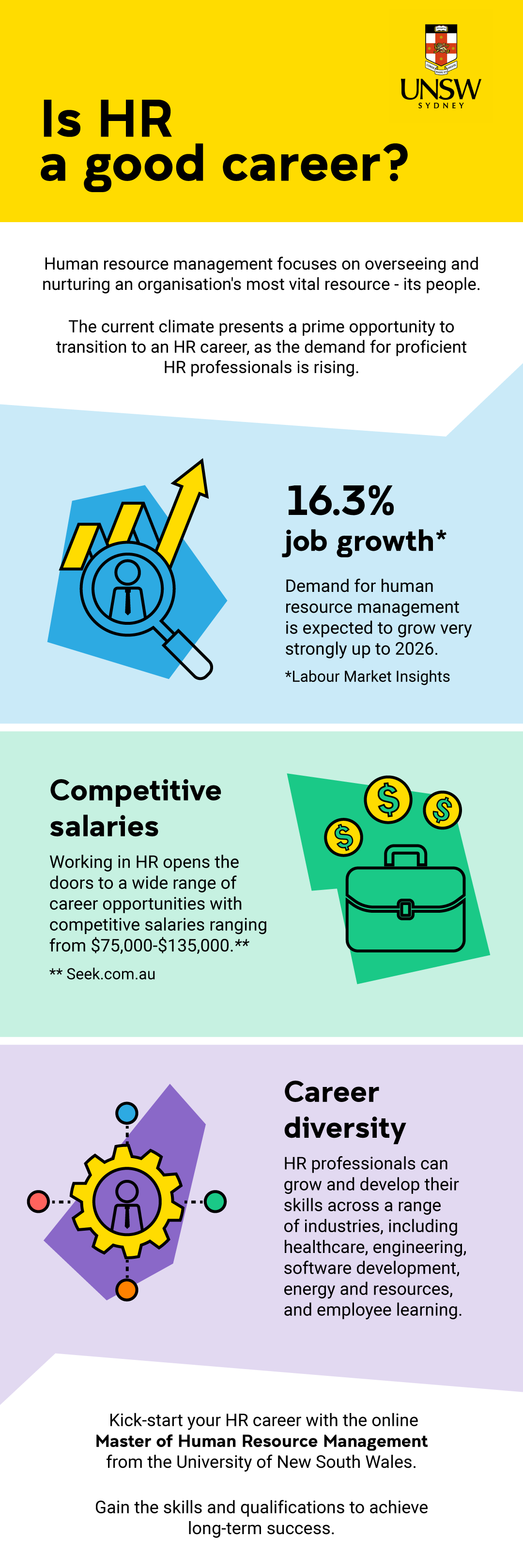Considering a career change and looking for a profession that offers fulfilment and growth? Are you organised with strong communication skills and a talent for building relationships? Human resource management (HRM) might be the perfect fit for you.
In this article, we’ll explore why HR is a good career choice and delve into industry demand for HR professionals in Australia. We will also outline how to get into HR in Australia – discussing the career opportunities and the skills and qualifications required. Let’s get started on your journey towards a successful HR career.
Is HR management a good career?
HRM is a field dedicated to managing and developing an organisation’s most valuable asset: its people. HR professionals help shape company culture, resolve conflicts and facilitate career growth for employees. These professionals positively affect people and their organisations, create a supportive work environment, promote employee wellbeing and contribute significantly to overall organisational success.
Dr Andrew Dhaenens, Key Academic for UNSW Online Human Resource Management Programs, says HRM professionals work “as strategic business partners in organisations to better manage their employees” across various functions. It’s a dynamic field that constantly evolves to meet the changing needs of the workforce.
As organisations recognise the strategic importance of effective HR practices, the demand for skilled HR professionals continues to grow. “HRM remains a strong career choice with high demand both within and outside Australia. With staffing challenges, workforce considerations and new challenges (and opportunities) across the world, the demand for human resource professionals has never been more important,” says Dr Dhaenens.
With Labour Market Insights predicting job growth of 16.3%, now is a great time to ponder more on the question ‘is human resources a good career?’ and consider a move into HRM.
How to make a career change to HR
The HRM field offers vast opportunities for growth and advancement. As professionals gain experience and expand their skill set, they can take on more challenging roles, specialise in specific areas, or even transition to leadership positions in HR.
For career changers considering entering the field of HR, pursuing postgraduate study can be an excellent choice – either in the form of a graduate certificate (suitable for those with an unrelated degree or relevant experience) or a master’s degree.
A graduate certificate, such as one in Human Resource Management, serves as a valuable stepping stone, allowing career changers to get a taste of the industry and explore their interests. However, progressing to a master’s degree showcases a deep commitment to the field.
Investing in a master’s degree demonstrates a candidate’s expertise and dedication and can help them stand out when applying for HR positions, increasing their chances of success in this competitive job market.
When selecting from the various study options, Dr Dhaenens has this suggestion: “Reputation and access to resources are some key considerations for students when evaluating programs. Specifically, the best programs are designed to help HR professionals bring expertise back into organisations across management, leadership and organisational development, diversity, equity, inclusion and analytics.
“The more knowledge, skills and abilities that HR professionals can build across these areas, the better outcomes we will have for employees, organisations and communities.”
The online Master of Human Resource Management at UNSW is an exciting program that is at the forefront of human resources in terms of the topics covered across the various courses.
This program contains both essential areas of HRM and key topics that reflect both current and future needs of HRM in organisations. It offers a full suite of HRM options, including a full master’s degree in HRM and individual graduate certificates in Human Resource Management (HRM), Diversity, Equity and Inclusion (DEI), Leadership and Organisational Development and HR Analytics.
One of the real advantages of this program is that students have the flexibility to build their expertise across all areas of HRM or devote their attention to specific areas where they would like to develop their careers and bring specialised knowledge back into organisations.
What types of HR careers are available?
Working in HR opens the door to a wide range of career opportunities in HR, each with its own responsibilities, salary expectations and paths for career progression.
Entry-level HR positions typically offer competitive salaries, while HR professionals with advanced degrees and years of experience can command higher salaries and secure leadership positions. Salaries in HR can also vary depending on the size of the organisation.
“HR professionals are found across all industries,” Dr Dhaenens says, “but you can see them most prevalent in the industries with high demand as well as significant change: healthcare, construction/engineering, software development, energy and resources, and education/employee learning.”
Let’s take a look at some of the prominent HR roles available:
Recruitment Consultant
Recruitment consultants are skilled professionals who connect candidates with job openings in client companies. They have various responsibilities, including advertising job vacancies, assessing CVs, negotiating employment terms and managing HR information systems. They support candidates through interviews, assess their fitness for specific roles and work closely with employers to meet their hiring requirements.
In Australia, a typical salary for this role is $75,000.
Human Resources Adviser
Human resources advisers are vital links between employees, managers and the HR team. They manage the recruitment process, address workplace issues, navigate organisational changes, handle HR inquiries, develop policies, conduct training and provide overall HR support – contributing significantly to effective HR management and playing a crucial role in creating a positive work environment.
In Australia, a typical salary for this role is $93,000.
Learning and Development Specialist
Learning and development specialists design and deliver training programs to enhance skills and performance. They assess needs, design engaging learning experiences, collaborate with external providers, provide career guidance and evaluate training effectiveness. Specialists can work directly for organisations or as consultants with various organisations.
In Australia, a typical salary for this role is $105,000. A Graduate Certificate in Leadership and Organisational Development or a Master of Human Resource Management (Leadership and Organisational Development) can help prepare you for a HR career that empowers growth on a individual, team and organisational level.
People and Culture Manager
People and culture managers are crucial in fostering a productive and inclusive workplace culture. In this role, they are responsible for creating positive work environments that align with organisational values, focusing on employee wellbeing and growth. They oversee HR functions, ensure compliance, develop policies and provide strategic guidance on people-related matters.
In Australia, a typical salary for this role is $130,000. If you’re interested in pursuing a career where you can make a positive impact in employee experience, you may consider studying a Graduate Certificate in Diversity, Equity and Inclusion or a Master of Human Resource Management (Diversity, Equity and Inclusion).
Human Resources Director
Human resources directors provide strategic leadership to the HR department. They develop and implement HR strategies, policies and programs aligned with organisational goals. Directors collaborate with management, shape company culture, foster a positive work environment and ensure compliance. As trusted advisors, HR directors provide guidance on complex HR matters, contributing to an organisation’s long-term success. In Australia, they can expect a typical salary of $135,000.
HR Analyst
An emerging role within human resource management, HR analytics professionals are responsible for providing valuable insights into workforce data. They do this by using data from activities such as recruitment, retention and employee engagement to help organisations make informed decisions on people-centric strategies that will optimise performance. As a vital link between business strategy and HR functions, human resource analysts are becoming increasingly more critical to the success of organisations as our workforce continues to digitally transform.
According to the Australian job site Jora.com, the average HR analyst's salary ranges from $90,000 to $110,000. If you're interested in pursuing a career as HR Analyst, you may be interested in the online Graduate Certificate in Human Resource Analytics or Master of Human Resource Management (Human Resource Analytics) from UNSW.
Choosing your HR career path
Transitioning your career and working in HR can be an immensely rewarding experience. The field offers the chance to positively affect the lives of individuals and organisations while enjoying a dynamic and evolving work environment. With the growing demand for HR professionals in Australia and various career opportunities available, now is a great time to pursue a career in HRM.
To kick-start your HRM career, consider exploring the online Master of Human Resources Management from UNSW. This comprehensive program equips students with the knowledge and skills needed to excel in HR and provides a strong foundation for career growth. To learn more about the program, get in touch with our Enrolment Advisors or download the program guide.
For a full list of UNSW's HR degrees, including undergraduate and postgraduate degrees delivered on campus, visit UNSW Business School.


